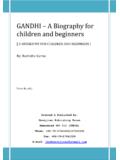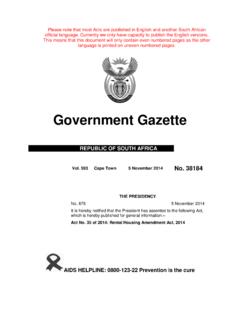Transcription of The principle of legality in constitutional matters with ...
1 The principle of legality in constitutional matters with reference to Masiya v Director of Public Prosecutions and Others 2007 (5) SA 30 (CC). LESEGA MNGUNI. LLB student, University of the Western Cape JUSTIN MULLER. Researcher, Law, Democracy & Development, University of the Western Cape SYNOPSIS OF THE FACTS. The complainant in the matter was a nine-year-old girl who alleged that she had been raped by a man who was known to her, Mr. Fanuel Sitakeni Masiya, on 16 March 2004. She was medically examined one week later on 23 March 2004. Mr. Masiya had initially appeared before the District Court at Sabie; later the case was referred to the Graskop Regional Court where he was charged with rape.
2 The complainant stated that she had been both anally and vaginally pen- etrated. The observations of the medical professionals did not confirm these allegations entirely, but expert medical evidence satisfied the Regional Court that anal penetration had indeed taken place and that the accused was the perpetrator. Although the common law definition of rape did not include anal penetration, the magistrate convicted the accused of rape and committed him to the High Court for sentencing The High Court confirmed that Magistrates' Courts are not expressly precluded from developing the common law for purposes of passing the constitutionality test.
3 The court, after much deliberation, concluded that the Magistrates' Court had been correct in its assessment that the definition of rape in the common law needed to be developed, that the definition of rape needed to be extended to include anal penetration, and that it needed to be applicable to males and female alike. The court recognised that the accused had been convicted of an offence that did not exist at the time when he com- mitted it ( , rape consisting of anal penetration) but accepted that his rights relative to retrospective criminalisation1 could, in the circumstances of the case, for various reasons be limited.
4 1 Section 35(3)(l) and (n) of the Constitution of the Republic of south Africa, 1996. 112. 112 10/8/09 11:08:23 AM. THE principle OF legality IN constitutional matters . In its judgment the majority of the constitutional Court confirmed that the definition of rape should be extended, but only to include female anal pen- etration. This finding was based on the notion that the common law needed to be developed in accordance with the spirit, purport and objects of the Constitution in terms of section 39(2) of the Constitution. Further, the court referred to Veldman v Director of Public Prosecutions, Witwatersrand Local Division2 (hereafter Veldman) in stating that the principle of legality was a central to the rule of law under our constitution.
5 The Court found that it would be sufficient to develop the common law prospectively in this case and, furthermore, that the extended definition should not apply in casu and that Mr Masiya should be charged with indecent assault as opposed to rape. THE principle OF legality . At its very basis, the principle of legality (nullum crimen sine lege) can be described as a mechanism to ensure that the state, its organs and its officials do not consider themselves to be above the law in the exercise of their func- tions but remain subject to it .3. The two main theories that this principle relates to are the doctrine of sub- stantive justice (also referred to as the crime control model) and the doctrine of strict legality (referred to as the due process model).
6 While the former is aimed at prohibiting and punishing any conduct that is socially harmful or causes danger to society, whether or not that conduct has been legally crimi- nalised at the moment that it was taken ,4 under the latter a person may only be held criminally liable and punished if at the moment that a transgression was committed it was regarded as a crime under the relevant legal order; in other words under the applicable law .5. The south african Constitution,6 in section 35(3)(l) and (n), contains indi- cations that south Africa adheres to the doctrine of strict The most important facets of the nullum crimen sine lege principle are as follows: An accused may not be found guilty of a crime and sentenced unless the type of conduct with which he is charged: (a) has been recognised by the law as a crime [known as the ius acceptum principle which is recognised in both common law and statutory crimes].
7 2 2006 (2) SACR 319 (CC). 3 See Snyman CR Criminal Law (2008) 36. 4 Cassese A International Criminal Law (2003) 140. 5 Ibid. 6 The Constitution of the Republic of south Africa, 1996. 7 Section 35(3) of the Constitution states that [e]very accused person has the right to a fair . Section 35 (3)(l) states that the right to a fair trial includes the right not to be convicted of an act or omission that was not an offence either under national or international law at the time it was com- mitted or omitted . In Section 35(3)(n), that deals with sentencing, states that a convicted person has the right to the to the benefit of the least severe of the prescribed punishments if the prescribed punishment for the offence has been changed between the time that the offence was committed and the time of sentencing.
8 The aforementioned principles are an indication that the south african Constitution favours the strict legality principle as both lean towards the favor rei principle which forms the basis of the strict legality doctrine that seeks to protect the accused against abuse of state power. Section 35(3)(l) and (n) give effect to Article 11(2) of the United Nations Universal Declara- tion of Human Rights. 113. 113 10/8/09 11:08:23 AM. LAW, DEMOCRACY & DEVELOPMENT. (b) in clear terms [the ius certum principle ];. (c) before the conduct takes place [the ius praevium principle ].
9 (d) without the court having to stretch the meaning of the words and concepts in the definition to bring the particular conduct of the accused within the compass of the definition [the ius strictum principle ], and (e) after conviction the imposition of punishment also complies with the four [preced- ing] principles [the nulla poena sine lege principle ].8. THE COURT'S POSITION WITH REGARD TO THE. principle OF legality . The central question with regard to the principle of legality was whether a conviction of rape, in this case, was in accordance with justice even though the definition of rape did not include non-consensual anal penetration at the time the crime was committed.
10 9. Despite the High Court's view that the principle of legality has no appli- cation in the case as no new crime was created ,10 both the majority and minority of the constitutional Court in Masiya v Director of Public Prosecu- tions and Others11 (Masiya) were in agreement that the principle of legality required that the accused not be charged under the extended definition of rape. The High Court substantiated its view on the relevance of the principle of legality by stating that Mr Masiya knew that he was acting unlawfully when he assaulted the complainant and that it has never been a requirement that an accused person should know, at the time of the commission of the crime, whether it is a common law or statutory crime or what its legal definition is.














